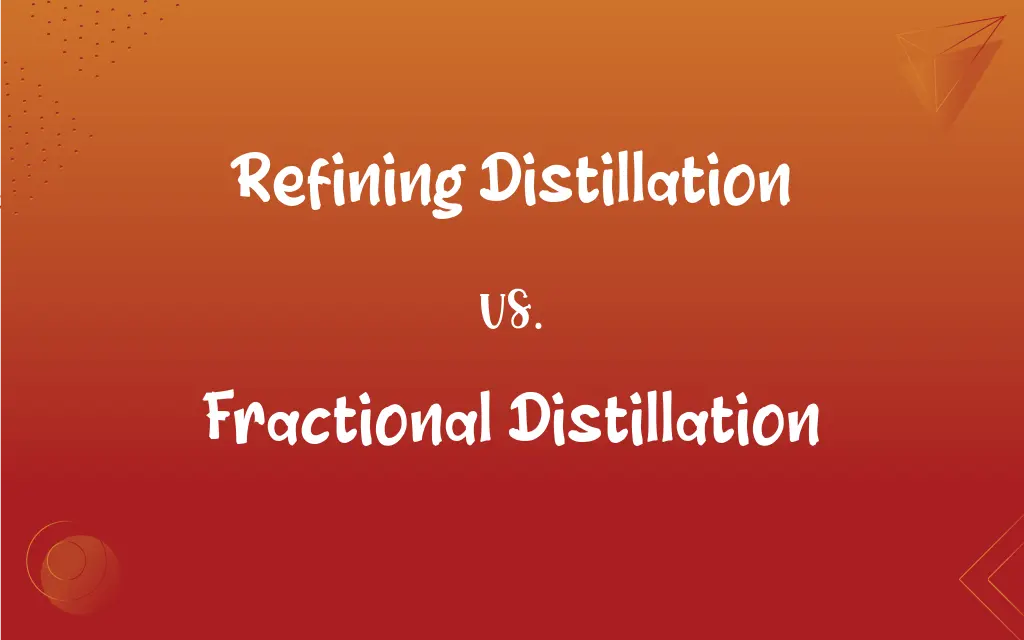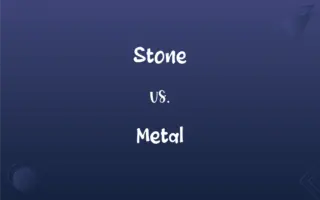Refining Distillation vs. Fractional Distillation: What's the Difference?
Edited by Harlon Moss || By Janet White || Published on February 12, 2024
Refining distillation purifies complex mixtures by repeated heating and cooling, while fractional distillation separates mixtures based on differing boiling points in a fractionating column.

Key Differences
Refining distillation and fractional distillation are both processes used in the separation of mixtures, particularly in the petroleum industry, but they differ in their methods and applications. Refining distillation, often synonymous with crude oil refining, involves the processing of crude oil into various useful products like gasoline, diesel, and kerosene. This process typically employs fractional distillation as a key step. Fractional distillation, on the other hand, is a more general process used in various industries and is not limited to crude oil. It involves the separation of a mixture into its component parts or fractions, based on differences in boiling points.
In refining distillation, the primary goal is to transform crude oil into various marketable products with specific characteristics. The crude oil is heated in a distillation column, and different hydrocarbons are separated based on their boiling points. Fractional distillation, used as a part of this process, allows for the separation of these components in a more precise and controlled manner. Fractional distillation involves the use of a fractionating column, which increases the efficiency of separation through multiple stages of condensation and vaporization. This technique is crucial in refining distillation to obtain products of desired purity and properties.
The equipment used in refining distillation and fractional distillation also differs. In refining distillation, large, complex distillation units are used, specifically designed for processing large volumes of crude oil. These units are equipped with various components like heaters, boilers, and condensers to facilitate the separation process. Fractional distillation, while it can be a part of these large systems, is also used independently in laboratories and other industries. The equipment for fractional distillation is often smaller and more varied, depending on the specific application, but it always includes a fractionating column to enhance the separation of different compounds.
Refining distillation and fractional distillation are integral to the petroleum industry but serve different purposes. Refining distillation is the overall process that transforms crude oil into usable products, employing fractional distillation as a key step for separating the different components of crude oil. Fractional distillation, while used in refining, is a broader technique applicable in various contexts, such as the chemical industry for separating chemical compounds, or in environmental science for purifying contaminated substances. It is the specific technique of separation based on boiling points, essential in the refining process but also widely used beyond it.
Comparison Chart
Process
Repeated heating and cooling
Separation using a fractionating column
ADVERTISEMENT
Efficiency
Less efficient for complex mixtures
More efficient, especially for complex mixtures
Boiling Point Separation
Less precise
Precise separation based on boiling points
Usage
Common in oil refining industries
Widely used in chemical laboratories
Complexity of Mixtures
Better for simpler mixtures
Ideal for mixtures with components having close boiling points
Refining Distillation and Fractional Distillation Definitions
Refining Distillation
Method to purify substances by multiple distillations.
Through refining distillation, the laboratory separated the desired compound from impurities.
ADVERTISEMENT
Fractional Distillation
Technique to separate liquid mixtures into individual components.
The chemical plant used fractional distillation for their complex mixtures.
Refining Distillation
Industrial method for purifying liquid mixtures.
The perfume industry relies on refining distillation for extracting essential oils.
Fractional Distillation
Process using a fractionating column for precise separation.
Fractional distillation allowed for the extraction of high-purity ethanol.
Refining Distillation
Purification of a mixture by repeated distillation.
The crude oil underwent refining distillation to become usable fuel.
Fractional Distillation
Method to separate components with close boiling points.
Fractional distillation efficiently separated the closely related organic compounds.
Refining Distillation
Technique used to refine crude products.
Refining distillation transformed the crude extract into a refined, consumable product.
Fractional Distillation
Distillation process for separating complex mixtures.
In the lab, fractional distillation was key to analyzing the sample's composition.
Refining Distillation
A process to separate components by boiling and condensation.
Refining distillation was key in obtaining pure alcohol from the fermented mixture.
Fractional Distillation
Separation of a mixture into fractions based on boiling points.
Fractional distillation was used to separate the hydrocarbon components.
FAQs
What is refining distillation?
A process to purify substances by repeated heating and condensation.
Where is refining distillation commonly used?
In industries like oil refining and perfume making.
What makes fractional distillation efficient?
Its use of a fractionating column allows for precise separation.
Can refining distillation separate close boiling point components?
It's less precise for closely related compounds compared to fractional distillation.
How does fractional distillation work?
It separates components based on differences in boiling points using a fractionating column.
What is the key equipment in fractional distillation?
The fractionating column.
Can refining distillation be used for alcohol production?
Yes, but fractional distillation provides higher purity.
Is fractional distillation more precise than refining distillation?
Yes, especially for mixtures with closely related boiling points.
How does the boiling point affect fractional distillation?
Components with different boiling points condense at different levels in the column.
What industries rely heavily on fractional distillation?
Chemical and petroleum industries.
Is refining distillation suitable for complex mixtures?
It's less suitable for complex mixtures compared to fractional distillation.
What are the limitations of refining distillation?
It's less efficient for complex or very similar mixtures.
How does a fractionating column enhance distillation?
It increases the surface area for condensation and evaporation, allowing finer separation.
Can refining distillation be automated?
Yes, but it depends on the complexity of the mixture.
Can fractional distillation separate all types of mixtures?
It's effective for liquid mixtures with different boiling points, but not for all substances.
Can refining distillation create pure substances?
It can significantly purify substances but may not always achieve absolute purity.
Does fractional distillation require more energy than refining distillation?
Generally, yes, due to the added complexity and precision.
Is training required to operate fractional distillation equipment?
Yes, it requires technical knowledge and skill.
What is a common example of refining distillation?
Purifying crude oil into gasoline.
What is the environmental impact of fractional distillation?
It depends on the scale and substance being distilled; it can range from minimal to significant.
About Author
Written by
Janet WhiteJanet White has been an esteemed writer and blogger for Difference Wiki. Holding a Master's degree in Science and Medical Journalism from the prestigious Boston University, she has consistently demonstrated her expertise and passion for her field. When she's not immersed in her work, Janet relishes her time exercising, delving into a good book, and cherishing moments with friends and family.
Edited by
Harlon MossHarlon is a seasoned quality moderator and accomplished content writer for Difference Wiki. An alumnus of the prestigious University of California, he earned his degree in Computer Science. Leveraging his academic background, Harlon brings a meticulous and informed perspective to his work, ensuring content accuracy and excellence.































































